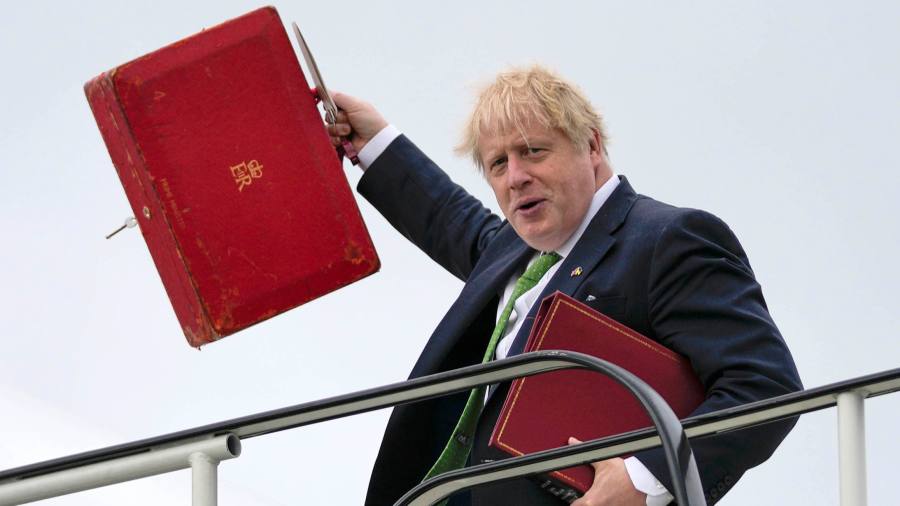
Finally, we have reached the moment when the cartoon characters look down and realise they’re already over the cliff. It gave the whole UK vertigo, watching Liz Truss and her cabinet being kept aloft by their delusions. Gravity has now prevailed, and she has resigned. But will it bring the Conservative party to its senses?
We Brits have been living in permanent overdrive. Businesses, investors and voters are forced to follow every twist and turn of events, as ministers resign, policies are announced and reversed, the pound goes up and down. The shambolic scenes in the House of Commons on Wednesday night, with Tory MPs resisting government attempts to make them vote, were a stain on our democracy.
The single most important job in British politics right now is to restore calm, and clear the debris after Truss’s disastrous “mini” Budget. The new chancellor Jeremy Hunt has wisely reversed most of that package, which shredded the UK’s reputation for financial competence, hiked government borrowing costs and left voters terrified about their mortgage rates. Since Hunt started effectively running the country only a week ago (in a job share with the bond markets), the pound has rallied and bond yields have eased back.
Yet there is a long way to go before the UK starts to look like a G7 country again, rather than an emerging market. The country will now be subjected to yet another Conservative leadership contest. Boris Johnson is flirting with making a comeback, Berlusconi-style. Others have thrown their hats in the ring, strangely undaunted by seeing how hard the job is.
The most honest way out, to secure a mandate and provide stability, would be a general election. But turkeys don’t tend to vote for Christmas — especially when they’re 30 points behind in opinion polls. There are only two ways to hold an election: either the prime minister asks the King to dissolve parliament, which Truss failed to do; or the House of Commons votes no confidence in the government, which is highly unlikely, given the Tory majority.
The alternative is for the Conservatives to stop bleating about the party and focus on the national interest. The aim should be to steady the ship until 2024 — if an election takes that long. Hunt has said, honourably, that he will continue at the Treasury. This means that the only plausible candidate for the top job is Rishi Sunak, whose warnings during the summer about Truss’s fantasy economics were spot on, and who MPs preferred only four months ago.
Yet a Sunak victory is far from assured, because of the looming presence of the man whose demise brought Truss to office. Johnson’s backers argue that he can unite the party, conveniently forgetting that half his cabinet resigned in July, believing he was unfit to govern. He also supported Truss for leader, perhaps hoping that her reign would retrospectively burnish his credentials. He cannot be allowed to have the last laugh — at the public’s expense. He is still the subject of an investigation into whether he misled parliament.
Many MPs are so hostile to him that Johnson may spend a few more days enjoying the attention then pull back. But if he stands and makes the final two, he is likely to win among Tory members who are once again being given the deciding vote.
This is truly astonishing. The UK was given Truss as prime minister by just over 80,000 people who were wholly unrepresentative even of Conservative voters. To let a tiny fraction of our population select a prime minister, rather than MPs who know the candidates, is insane. Her colleagues knew that Truss was called the “human hand grenade” for the way that she would grab impulsively on to an idea and charge ahead.
The apparent lack of vetting also raises serious security issues; journalists at Tortoise Media have registered a pet tortoise as a party member.
A moderate, caretaker government is now urgent and still possible. Until this week, I had assumed that such a solution would be undermined by the Brexit-obsessed right. But the polls are so dire that even those with conventionally “safe seats” — majorities of 20,000 — now fear for their futures. Even the Faragists are not immune: it may sober them.
Labour might even be privately grateful for a bit longer in opposition, knowing that the current situation requires immensely tough choices about tax and spending. When David Cameron and George Osborne came to power in 2010, in the aftermath of the financial crisis, Labour’s chancellor Alistair Darling had already done a good deal of the heavy lifting. When Tony Blair and Gordon Brown won in 1997, they accepted the fiscal trajectory which had been laid out by Ken Clarke.
Politicians like Darling and Clarke are the unsung heroes of our democracy, the guys left holding the parcel when the music stopped, and handled it with care, not ego. The Conservatives should heed this lesson. They have already given us two dreadful parodies of a government. The country will not wear another.